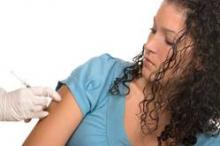Administering a third booster dose of the MMR vaccine during a mumps outbreak has been shown to decrease the spread of the disease in an already highly vaccinated population, according to a study published online in Pediatrics.
The vaccination intervention in one community led to a 96% drop (from 4.93% to 0.13%) in mumps attack rates among 11- to 17-year-olds, the population targeted in the intervention, reported Dr. Ikechukwu U. Ogbuanu of the epidemic intelligence center at the Centers for Disease Control and Prevention and his associates (Pediatrics 2012 Nov. 5 [doi:10.1542/peds.2012.0177]). The communitywide rate decreased by 75.6% (from a 0.86% attack ratio preintervention to 0.21% in the 3-week postintervention period).
A mumps outbreak involving 3,502 cases in the Northeastern United States from June 1, 2009, to June 30, 2010, included 790 cases in a close-knit Orthodox Jewish community in Orange County, N.Y. Officials selected that community, which represented 22.6% of the outbreak’s cases, to initiate a third-dose MMR vaccination intervention in three schools when standard outbreak control measures failed to slow the disease spread.
The outbreak had been traced to an 11-year-old U.S. resident who had received two doses of the MMR vaccine but had just returned from the United Kingdom where a mumps outbreak was ongoing. After he attended an Orthodox Jewish boys’ camp in New York, 25 cases were reported among campers. The disease then spread to families in the community when these boys returned home, reaching 392 cases in Orange County by Dec. 31, 2009. Among those who contracted the disease, 74% (290 patients) had received both MMR vaccine doses.
A third dose of the MMR was offered to 6th-12th graders at three of four schools in Orange County. Schools eligible for the intervention were required to have high two-dose MMR coverage and to have ongoing mumps transmission for the 2 weeks leading up to the intervention. Students who had not gotten mumps during the outbreak and had already had two doses of the MMR vaccine were eligible to receive the third dose from Jan. 19 to Feb. 2, 2010. Of 2,178 eligible students, 1,755 (80.6%) received the third dose.
Researchers then calculated mumps attack rates three times: in the 3 weeks before and after the vaccination intervention, and at 3 weeks following the second 3-week report. The average mumps incubation period is 16-18 days. Researchers divided the new mumps cases in each data collection period by the number of students who did not have mumps at the start of the period, to get the attack ratios.
The mumps attack rate among all students at the three schools dropped from 4.9% in the 3 weeks before the third dose was administered to 1.55% in the 3 weeks afterward (P value less than .001). During this second phase, rates were similar among vaccinated (1.60%) and unvaccinated (1.67%) students, but cases among vaccinated students were eight times lower (P = .097)* in the third phase of data collection, when the overall attack rate among all the students at the intervention schools dropped to 0.13%.
Follow-up data from 1,597 students who received the third dose (91% response rate) revealed adverse events occurring in 115 students (7.2%), primarily "pain, redness, or swelling at the injection site" and "joint or muscle aches." No students reported serious adverse events.
One study limitation was that the intervention occurred after the outbreak’s peak, so "it is not possible to exclude the possibility that the rapid decline in incidence after the intervention was entirely unrelated to our intervention," the authors wrote. The authors also noted their results mean a third MMR dose might be effective in outbreak control only in "highly vaccinated populations in certain settings" but do "not support the routine use of a third dose of mumps vaccine in national vaccination programs."
The investigators reported no external funding and no financial disclosures.
*Correction, 11/06/2012: An earlier version of this article misstated the p value.


